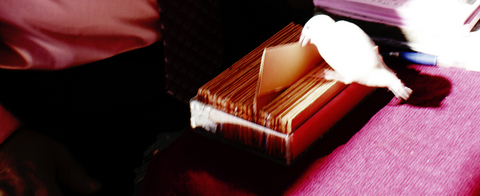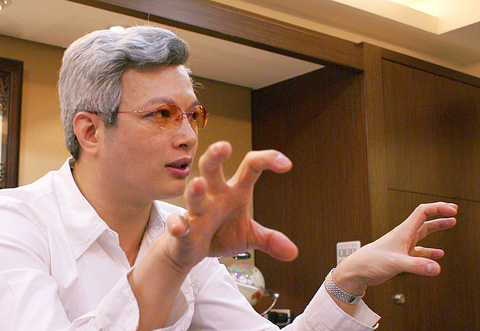With Lunar New Year quickly approaching, the Hsingtien Temple (行天宮) in downtown Taipei is filling with people seeking the advice of fortune-tellers on subjects ranging from marriage to business.
The area around the temple is filled with booths and shops purporting to delve into the future. Some fortune-tellers specialize in palm reading (看手相) or face reading (看面相), while others use a bird (靈鳥卜卦) to divine a customer's fate.
In the upscale shopping district in east Taipei, fortune tellers of a different kind are plying their trade.

PHOTO COURTESY OF CHARLES SUNG
An application of science?

PHOTOS: NOAH BUCHAN, TAIPEI TIMES
Tsai Shang-chi (蔡上機) sits behind a large wooden desk on top of which are delicate teacups, a computer monitor with stocks prices on the screen and a catalogue bound in leather for Mercedes Benz automobiles. This is the Chinese astrologer's second interview of the afternoon and it seems he's just warming up his banter.
According to Tsai, the month before Chinese New Year is his busiest time of the year.
"People want to know predictions for the New Year and tips that can help them get lucky. Sometimes, I do live interviews for news programs to share my opinion … I have given more than 10 lectures in the past two months," he said.

Born into a family of fortune-tellers, Tsai became interested in both numerology and feng shui when he was a boy. Leaving home at age 14 he moved to Taipei to study the art of divining with numbers with various masters before setting out on his own two years later. "Being a young fortune-teller, it was difficult to attract customers," he said.
To prove his mettle as a number cruncher, he did a considerable amount of research into the art of numerology, the fruits of which were published in his first book about Chinese astrology called Ziweidoushu (紫微斗數). Since then, he has published over 36 books covering topics such as Chinese astrology, feng shui and face reading. He has even published books about cosmetics and fate as well as crystals and fortune-telling. The number of books he has written and their popularity attest to why he has a catalogue for luxury cars on his desk. And though Tsai has branched out from where he began as a fortune-teller, his main interest still revolves around Chinese astrology.
Chinese astrology — or numerology (命理), sometimes translated as the "principle of fate" — purports to divine a person's fate using numbers as symbols. One of the more common methods of determining a person's fate is to apply numeric values to the day, month, year and hour of when they were born. These numbers are then used to determine a person's fortune.
Tsai uses the lunar calendar, rather than the Gregorian calendar used in Western divination, to interpret a person's fate. But that's not all. In addition to calendrical calculations, a whole esoteric system of branches and stems are used by fortune-tellers to understand their customer's future, the calculations of which are then used to offer suggestions for future actions.
Tsai says it is important to differentiate between Chinese astrology and feng shui. While Chinese astrology falls within the purview of numerology, feng shui, also called geomancy, is about the arrangement of objects.
Many are critical of astrology in any form, whether Occidental or Oriental. Tsai scoffs at this cynicism. He concedes that though there are many quacks plying the same trade, he is quick to add, "those who criticize numerology are often the same people who don't know anything about it."
Marketing fate
"Some scientific theories fall into the category of philosophy before being proved," said Tsai, who sees fortune-telling more as philosophy than science. "These fortune-telling theories haven't been proved by science, but these are the great achievements of ancient thinking."
Indeed, Tsai has coined a new term for this so-called branch of "science" — numerological philosophy (命理哲學).
"Ancient masters found a formula to classify people according to certain characteristics. People with the same characteristics look alike." These characteristics were then given a numerical value that could be used by later generations.
If Tsai sees fortune-telling as a kind of philosophy before science, Christina Hsu (許璧玉) regards it as a kind of self-help therapy. Hsu is a project manager for Rain Spring Technology (雨揚科技股份有限公司), a fortune-telling business named after its founder Yu Yang (雨揚) that focuses mainly on the needs of women. A self-professed amateur fortune-teller, Hsu says that numerology helps people to face their problems.
"After understanding the content of her [fortune], a woman who is willing to change [her] attitude is able to face her problems and will be different than before. We hope that people will love themselves, for if they lose this [love of self] how can they expect to love others?"
Hsu says people who come to Rain Spring Technology are looking for a direction and Yu Yang provides the direction that they require. "I see a fortune-teller as a psychologist who gives people hope and the help people need to solve their problems," she said.
Hsu says that the majority of fortune-telling clients are women.
"Chinese males are usually the core of the family with heavy responsibilities and they want to maintain their image, their face," she said. "In this way, the female … plays the role of asking questions of fortune-tellers to help their family."
Rain Spring Technology not only seeks to provide face-to-face services but also provides a variety of merchandise — known as fopai (佛牌) — that the customer can carry with them.
Mingyun (命運), according to Hsu, refers to a person's status determined at birth. "Ming means fate … and is fixed, not open to change. But yun (運) [fortune] can be altered," she said.
Fortune enables a customer to alter fate. According to Hsu, once a person understands their fate and fortune, they are in a better position to determine their future.
Some companies have designed products that they claim help customers change their fate. The office where Hsu works has a variety of cases displaying products including bracelets, glass sculptures in the shape of tigers and dragons and fashionable handbags ranging in price from NT$200 to as high as NT$8,000. Improving one's fortune, it seems, can sometimes be costly.
The commercialization of fortune-telling has led some practitioners to do away with charging a fee for divination altogether. Jimmy Bai (白龍王) is one such fortune-teller. Bai says that his merchandise is an indispensable part of his service. His sparsely decorated office is lined on both sides with display cases, inside of which there are a variety of objects — some scented — that customers purchase to wear or display in their homes.
So does fortune-telling help people deal with their personal problems? Chiu Hai-yuan (瞿海源), a research fellow in the Institute of Sociology, Academia Sinica, and sociologist at National Taiwan University who has done considerable research on fortune-tellers in Taiwan, thinks not.
"According to our surveys, when we asked [people] if going to a fortune-teller was effective in reducing their stress, most of them said 'no.' Only a few of them said it was effective."
All in the mind
And though Chiu offers little evidence to suggest why fortune-tellers remain popular in Taiwan — and indeed throughout the world — he does say that the uncertainty of modern society creates a considerable amount of stress on the individual.
"When [people] feel uncertain, they try to solve [their problems] by going to the fortune-teller or using astrology."
Although Chiu believes that fortune-telling is a false science, he points out that many of those who patronize fortune-tellers — especially in Taipei — are from society's economic elite.
Celebrities and the politicians often turn to fortune-tellers for advice.
"Business people, especially those in show business, are rich and uncertain. So fortune-telling is very popular [among them] because it provides the kind of certainty that's needed," Chiu said. "Politicians will ask the fortune-tellers for help because the political situation is very uncertain, especially during elections."
Chiu cites the example of how a few years ago the Chinese Nationalist Party (KMT) headquarters asked every candidate running for office to submit their personal information so that their fortunes could be calculated.
In addition to political and economic uncertainty, Chiu says fortune-tellers do a brisk business because they can speak with authority on a variety of arcane topics related to a person's fate and fortune.
"They are very knowledgeable … very smart. They can memorize a lot of rules. They have some very sophisticated rules that they can memorize very clearly and can respond spontaneously and … they look very professional," Chiu said.
Which is probably why Tsai and Yu Yang appeal to so many. Regardless of whether it is seen as a philosophy bordering on science or a self-help remedy, critics of the practice are largely ignored in favor of a little peace of mind.

May 11 to May 18 The original Taichung Railway Station was long thought to have been completely razed. Opening on May 15, 1905, the one-story wooden structure soon outgrew its purpose and was replaced in 1917 by a grandiose, Western-style station. During construction on the third-generation station in 2017, workers discovered the service pit for the original station’s locomotive depot. A year later, a small wooden building on site was determined by historians to be the first stationmaster’s office, built around 1908. With these findings, the Taichung Railway Station Cultural Park now boasts that it has

Wooden houses wedged between concrete, crumbling brick facades with roofs gaping to the sky, and tiled art deco buildings down narrow alleyways: Taichung Central District’s (中區) aging architecture reveals both the allure and reality of the old downtown. From Indigenous settlement to capital under Qing Dynasty rule through to Japanese colonization, Taichung’s Central District holds a long and layered history. The bygone beauty of its streets once earned it the nickname “Little Kyoto.” Since the late eighties, however, the shifting of economic and government centers westward signaled a gradual decline in the area’s evolving fortunes. With the regeneration of the once

The latest Formosa poll released at the end of last month shows confidence in President William Lai (賴清德) plunged 8.1 percent, while satisfaction with the Lai administration fared worse with a drop of 8.5 percent. Those lacking confidence in Lai jumped by 6 percent and dissatisfaction in his administration spiked up 6.7 percent. Confidence in Lai is still strong at 48.6 percent, compared to 43 percent lacking confidence — but this is his worst result overall since he took office. For the first time, dissatisfaction with his administration surpassed satisfaction, 47.3 to 47.1 percent. Though statistically a tie, for most

In February of this year the Taipei Times reported on the visit of Lienchiang County Commissioner Wang Chung-ming (王忠銘) of the Chinese Nationalist Party (KMT) and a delegation to a lantern festival in Fuzhou’s Mawei District in Fujian Province. “Today, Mawei and Matsu jointly marked the lantern festival,” Wang was quoted as saying, adding that both sides “being of one people,” is a cause for joy. Wang was passing around a common claim of officials of the People’s Republic of China (PRC) and the PRC’s allies and supporters in Taiwan — KMT and the Taiwan People’s Party — and elsewhere: Taiwan and